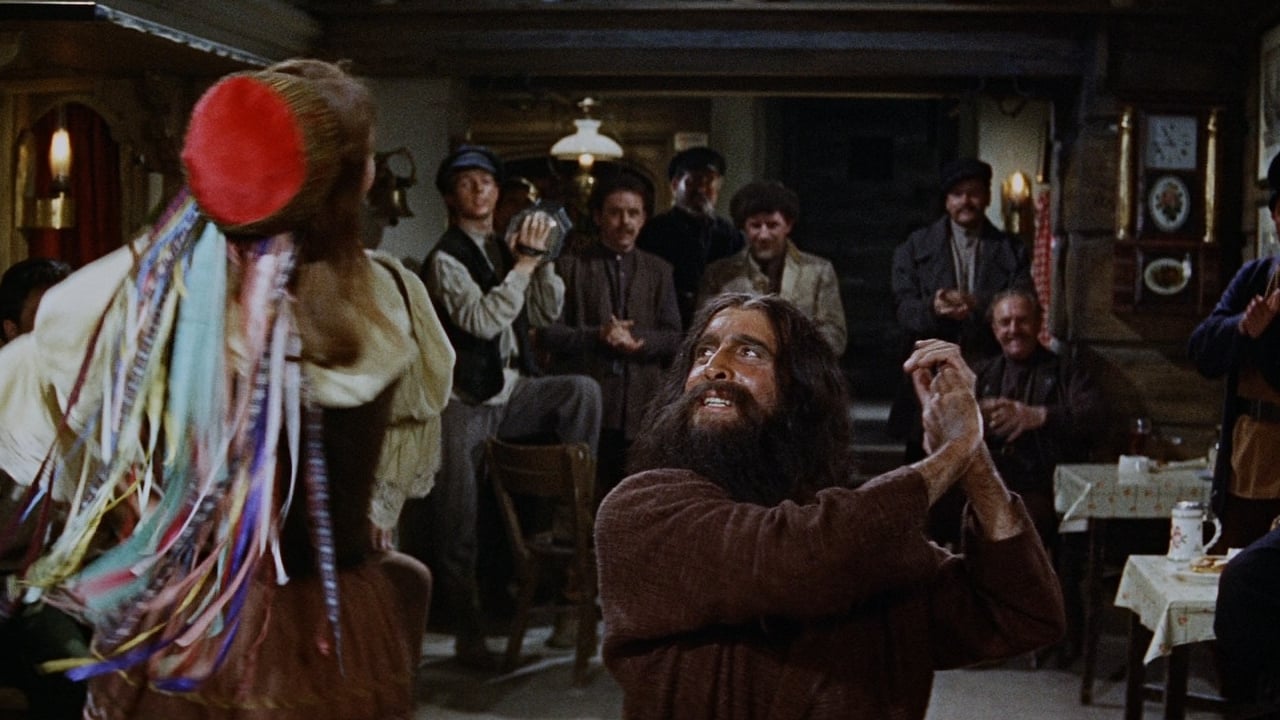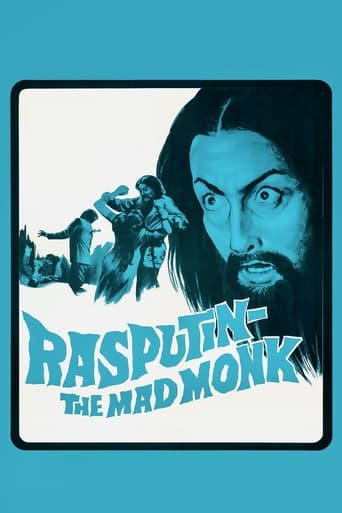Matrixiole
Simple and well acted, it has tension enough to knot the stomach.
TaryBiggBall
It was OK. I don't see why everyone loves it so much. It wasn't very smart or deep or well-directed.
HottWwjdIam
There is just so much movie here. For some it may be too much. But in the same secretly sarcastic way most telemarketers say the phrase, the title of this one is particularly apt.
Micah Lloyd
Excellent characters with emotional depth. My wife, daughter and granddaughter all enjoyed it...and me, too! Very good movie! You won't be disappointed.
Spikeopath
1966 was a prolific year for Hammer Films, the company would have 6 films released this year, unsurprisingly the quality of such was variable. Rasputin the Mad Monk was filmed back to back with Dracula Prince of Darkness, yet even though the BBFC afforded it the "X" certificate, it's somewhat tame and more a historical drama than horror film.In truth it's Christopher Lee as the title character who keeps this from plunging the depths of stinkerville, and this in spite of sporting a most distracting and ridiculous beard. Plot simply - and fancifully - shows Rasputin as a hard drinking, womanising bully with a penchant for hypnotism, all of which he uses for his nefarious ends.It's all very colourful, with Lee holding court as male saps and beautiful dames (Barbara Shelley oh my eye!) come and go, which all builds to a furious finale in the Hammer Films tradition. Yet the slow pace, weakness of the story and the overt feeling of watching a rush job, stops this from being anything but a Hammer time waster. 6/10
James Hitchcock
Grigory Yefimovich Rasputin was a controversial figure, but there can be no doubt that he was also a remarkable one, even if one also regards him as a charlatan. For an uneducated peasant to have risen to be the close friend and confidant of one of the world's most powerful monarchs is no mean achievement. What, however, caused him to live in the popular imagination was his own bloody murder in 1916, followed by that of the Imperial Family two years later in the wake of the Russian Revolution. Had there been no Revolution, Rasputin would today be a minor figure, forgotten by all except specialists in the history of early twentieth century Russia.It is hardly surprising that there have been a number of films about him, the first- presumably an anti-Russian propaganda film- being made in Germany only a year after his death. "Rasputin and the Empress" from 1932 is remembered today less by film buffs than by it is lawyers, as it gave rise to a lawsuit which led to one of the leading cases in English libel law. He appears in "Nicholas and Alexandra" from 1971, but only in a supporting role; as its title suggests that film deals primarily with the doomed Imperial couple. Probably the best film of his life that I have seen is the 1996 TV movie "Rasputin" starring Alan Rickman. In this version, made by Hammer in 1966, Rasputin is an Orthodox monk who is expelled from his monastery for debauchery and violence. He gains a reputation as a faith-healer which brings him to the attention of the Tsarina's lady-in-waiting, Sonia, whom he seduces and uses to gain access to the Tsarina herself. When he heals her son Alexei, who has been injured in a fall, he becomes her most trusted confidant, and uses this position to make himself the most powerful main in Russia. His rise to power, however, attracts opposition, and Sonia's brother Peter and a friend, Ivan, lead a conspiracy to kill him. The film is famously inaccurate, and the inaccuracy starts with the title; Rasputin, a self-proclaimed "holy man", was never a monk. (Nor, for that matter, was he mad). I will not attempt to catalogue all its inaccuracies, as to do so would turn this from a film review into a history lecture and would take it well over the 1000-word limit. Suffice it to say that Tsar Nicholas never appears; indeed, the incorrect impression is given that Alexandra was Tsarina in her own right rather than the consort of a Tsar. No mention is made of the First World War, the approaching Revolution or any aspect of the film's political background. One character has the decidedly non-Russian Christian name of "Vanessa". Some of the inaccuracies, however, were deliberate. The 1932 lawsuit was brought by Rasputin's assassin, Prince Felix Yusupov, and his wife Princess Irina, who objected to the way in which they, or characters based upon them, had been portrayed in the film, and as both were still alive in 1966 Hammer were keen to ensure that no characters in their version could be identified with the couple. Historical inaccuracy does not always make a film a complete failure. Nobody, for example, would claim that "Braveheart" is an accurate reflection of the life and times of William Wallace or of the Anglo- Scottish wars of the late thirteenth and early fourteenth century, yet it works reasonably well in the cinema if one sees it simply as an exciting adventure film about a brave patriot resisting a tyrannical invader. "Rasputin: the Mad Monk", however, just does not succeed in the same way. Some have praised Christopher Lee in the title role, but to my mind his performance cannot compare with that given by Alan Rickman in the 1996 film. The historical Rasputin seems to have had great charisma and a certain spirituality; his claim to possess abilities as a faith healer may have been genuine. Combined with these qualities, however, were his notorious moral weaknesses; he was both a drunkard and a womaniser. (His enemies seized gleefully on the similarity between his surname and the Russian adjective "rasputniy", meaning "debauched"). His influence over the Tsar was not always a beneficent one, although it is noteworthy that he opposed the fateful decision- to go to war with Germany in 1914- which was eventually to lead to the downfall of the Romanovs. All these contradictory sides of his character are brought out by Rickman, giving us a portrait of a strange, driven individual, both mystic and fanatic, holy man and sinner. Lee, by contrast, delivering all his lines in a deep, sonorous voice, gives us a one-note performance, playing Rasputin as a villain and nothing else, an interpretation which I found not only less historically accurate but also less dramatically interesting. Hammer were a studio best known for horror films, and "Rasputin the Mad Monk" from is essentially a horror film dressed up as a historical drama. Although it contains no ghosts, vampires or other supernatural beings, there is a suggestion that Rasputin possesses Satanic powers and uses these to manipulate Sonia and the Tsarina. His assassins are not men motivated by political concerns but the equivalent of Van Helsing in the "Dracula" films, men on a mission to rid Russia of a malevolent supernatural force. The trouble is, the real Rasputin was a lot more interesting than that. The film is a good example of the sort of fiction which is a lot more commonplace than the truth. 4/10
Michael O'Keefe
From the fabled Hammer Studios comes a distortion of Russian history, but its in that great vivid Hammer color. Most assuredly a lot of liberties have been taken with this tale about a "man of mystery", Rasputin, brought to life by who else but Christopher Lee. This movie shows how The Mad Monk used unexplainable evil powers to garner, or demand, influence and manipulate anyone of his choosing. Rasputin also saw himself having a physical prowess with women; and even eased entry to the court of the czar. My favorite scene is the sequence leading to his assassination; but how was this head strong character so easily duped. Remember this film forgoes accuracy in favor of entertainment. Also in the cast: Barbara Shelley, Francis Matthews, Dinsdale Landon, Robert Duncan and Richard Pasco.
mukava991
Rasputin was such a colorful character that movies have found him irresistible for nearly a century and he always fascinates no matter what kind of treatment scenarists cook up. Hammer Films whittles the epic tale down to the format of a low-budget horror programmer, starring Christopher Lee in an entertaining and lusty performance as the "mad monk." He delivers what the quickie script requires and is the main reason to watch. The emphasis is on the title character's prodigious appetite for liquor and women, quasi-supernatural powers of hypnosis and healing, brute strength and general boorishness. He is presented as a crudely power-hungry figure brazenly manipulating his way up the social ladder from rural obscurity to the chambers of the Tsarina. The historical context in which he rises to power (the decline of the aristocracy, the shadow of revolution, the dislocations of war, the fatal trust of the Tsarina in his demented political recommendations) is pretty much eliminated. Early 20th century Russia is portrayed through the use of well decorated studio interiors, with only one crowd scene in a city marketplace. World War One, which was raging during Rasputin's final days, is not even mentioned in passing, though his relationship with the royal family is sketchily dramatized. Even his eventual assassination, as gory and nasty as they come, leaves out a great deal, including the gunshots, beating, and disposal of his corpse into the Neva River, concentrating instead on the poisoned food (candies here, cakes in reality) and drink. In this bare-bones treatment, a handful of characters is invented to represent the large numbers of individuals whose negative experiences with Rasputin added up to a widespread desire for his demise. The scenario is in the "kill the monster" vein. Not bad overall.

